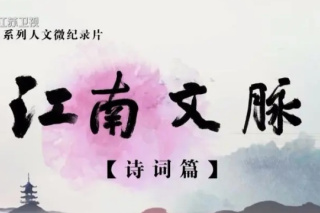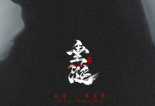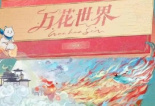《Jiangnan Culture·Poetry》 is a series of humanistic micro-documentaries showing the rich poetry culture of the Jiangnan region. It contains a total of 50 episodes, each episode is about 5 minutes long.This documentary deeply explores the gorgeous poems left by literati and poets in the Jiangnan area for thousands of years. Through delicate lens language and simple explanations, it leads the audience to travel through time and space and appreciate the natural beauty and humanistic spirit of Jiangnan.
Each episode focuses on one or several classic poems related to Jiangnan, ranging from works by famous writers in the Tang and Song Dynasties to poems from the Ming and Qing Dynasties and even modern times, covering a wide range of themes from landscapes and pastoral to urban life.The documentary not only interprets the literary value of the poems, but also explores the close connection between these poems and the geography, history, and culture of Jiangnan, and how they reflect and shape the context of Jiangnan.
Through the historical lens, the audience can see the picturesque Jiangnan water towns, hear the low singing of poets and poets, and feel the continuity and unique charm of Jiangnan culture from ancient times to the present.《Jiangnan Culture·Poetry》In the form of a micro-documentary, the natural scenery, historical relics, humanistic stories and poetry art of Jiangnan are cleverly combined. It is not only a cultural journey, but also an affectionate tribute to traditional Chinese culture.Let the audience experience the profound heritage and immortal inheritance of Jiangnan culture in a short and concise space.
Episode 1
《Jiangnan Context·Poetry》Episode 1 focuses on Zhang Ji's《Night Mooring at Maple Bridge》 of the Tang Dynasty.This humanistic micro-documentary series explores the rich poetry culture of Jiangnan in depth. Each episode revolves around one or several classic poems related to Jiangnan. Through delicate narratives and pictures, it leads the audience to appreciate the natural scenery and history of Jiangnan.Stories and cultural sentiments.
- Night Mooring at Maple Bridge - is a representative work of Tang Dynasty poet Zhang Ji. The poem depicts the night sceneries of Jiangnan water towns, especially the Maple Bridge in Suzhou, expressing the poet's loneliness and homesickness during his journey.The poem is as follows: “The moon is setting, the crows are crying, the sky is covered with frost, and the rivers, maples, and fishing fires are facing melancholy.At Hanshan Temple outside Gusu City, the bell rang for the passenger ship at midnight.”This poem not only shows the beautiful scenery of Jiangnan, but also contains profound cultural connotations. It is an important window for understanding the cultural context of Jiangnan.
《Jiangnan Context·Poems》Through such poems, the audience can not only appreciate the beauty of poems, but also show the unique cultural features and historical changes of Jiangnan through the stories and history behind the poems, which is an important way to learn and experience traditional Chinese culture.excellent resources.
Episode 2
《Jiangnan Context·Poems》Episode 2 focuses on the works of another ancient poet, such as Bai Juyi's 《Recalling Jiangnan》 series.
Bai Juyi's "Recalling Jiangnan" is a famous poem describing the beautiful scenery of Jiangnan. One of the most popular poems is: "Jiangnan is good, and the scenery is familiar to me."When the sun rises, the flowers on the river are as red as fire, and when spring comes, the river is as green as blue.Can you not remember Jiangnan?%This poem uses concise and lively language to outline the bright colors and vitality of spring in the south of the Yangtze River, and expresses the poet's deep nostalgia and praise for the beautiful scenery in the south of the Yangtze River.
Through such poems, Episode 2 may deeply explore the intertwining of Jiangnan’s natural landscape and humanistic emotions, showing that Jiangnan is not only a geographical concept, but also a collection of culture and emotions.《Jiangnan Culture》Through such poetic chapters, the series not only allows the audience to appreciate the natural beauty of Jiangnan, but also has a deeper understanding of the delicate emotional expression and historical accumulation in Jiangnan culture.
Episode 3
《Jiangnan Context·Poems》Episode 3 focuses on the Tang Dynasty poet Zhang Hu's poem titled Jinling Ferry.This poem takes the ferry in Jinling (now Nanjing) as the background, showing the tranquility and rich history of the Jiangnan water town.Zhang Hu used delicate brushwork to depict the night scene of the ferry, reflecting the poet's deep feelings about the customs of Jiangnan and his recollection of the past.
The poem contains emotions about historical changes and praise for the unique charm of Jiangnan.
“Jinling Crossing the small mountain tower, travelers can worry about it for a night.In the setting moon of the river at night when the tide is falling, two stars and three stars are like Guazhou.”This poem creates a quiet and slightly melancholy atmosphere through the river scenery under the moonlit night and a few lights in the distance, reflecting the unique expression of the integration of natural landscape and humanistic emotions in the Jiangnan context.
《Jiangnan Context》Through such poems, the audience can feel that Jiangnan is not only a geographical Jiangnan, but also a cultural and emotional Jiangnan. It is a poetic space where history and nature are intertwined.
Episode 4
《Jiangnan Context·Poems》Episode 4 provides a detailed interpretation of Huishan Tingsong Temple-- by Pi Rixiu, a poet from the Tang Dynasty.This poem uses the location of Tingsong Temple in Huishan to show the tranquility of the Jiangnan landscape and the magnificence of the pine waves, reflecting the poet's deep understanding of the natural beauty and his yearning for a secluded life.
Pi Rixiu used delicate brushstrokes to combine the environment of Tingsongan with personal emotions, conveying the theme of seeking peace of mind in nature.
“The autumn moss on the Panasonic stone platform makes the sound of the spring sound its own rhythm.”Through such poems, Pi Rixiu described the tranquility of Huishan and the gurgling spring water, creating an artistic conception far away from the hustle and bustle.
This episode of "Jiangnan Culture" not only allows the audience to appreciate the poetry of Jiangnan landscapes, but also explores the unique perception of natural beauty and the pursuit of spiritual freedom in Jiangnan culture through the eyes of the poet.
Through such interpretation of poetry, the audience can have a deeper understanding of the emphasis on the harmonious coexistence of nature and humanity in the Jiangnan context.
Episode 5
《Jiangnan Context·Poems》Episode 5 provides an in-depth analysis of the Song Dynasty poet Xin Qiji's《The Green Jade Case·Yuan Xiu》.This poem takes the Lantern Festival as the background, depicts the prosperous scene of the Jiangnan festival, and at the same time incorporates the poet's profound expression of personal emotions.
Xin Qiji showed the festive atmosphere of Jiangnan through the dimming of lights on Lantern Festival night, and also contained philosophical thoughts on ideals and reality, search and loss.
“The east wind blooms thousands of trees at night.More blowing down, the stars are like rain.BMW's carved cars fill the road with fragrance.”These words vividly describe the grand scene of the Lantern Festival night, and “the crowd searched for him thousands of times, but suddenly looking back, that person was there, in the dimly lit place.” expresses the poet's delicate emotions of finding the right person among the crowd, as well as his desire and pursuit of beautiful things.
《Jiangnan Culture》Through this episode, it not only shows the unique charm of Jiangnan festival culture, but also explores how the poets of the Song Dynasty found their spiritual destination behind the prosperity, reflecting the delicate emotional world and profound philosophy of Jiangnan culture.think.
Episode 6
《Jiangnan Context·Poetry》Episode 6 focuses on the Tang Dynasty poet Bai Juyi's《Recalling Jiangnan》.
This poem is Bai Juyi's affectionate memory of the beautiful scenery in the south of the Yangtze River, especially his praise of the spring in the south of the Yangtze River.Pass“ Jiangnan is good, and the scenery is familiar to me.When the sun rises, the flowers on the river are as red as fire, and when spring comes, the river is as green as blue.
”With such words and phrases, Bai Juyi described the splendor of spring in the south of the Yangtze River and the clarity of the river, showing the natural beauty of the south of the Yangtze River and the poet's nostalgia for this experience.
Through Bai Juyi's perspective, this episode leads the audience to appreciate the characteristics of Jiangnan's water towns and the vitality of spring. It also reflects Jiangnan's unique status in the hearts of literati and the love and praise of natural landscapes in Jiangnan culture.
《Jiangnan Context》Through《Remembering Jiangnan》This poem not only shows the natural scenery of Jiangnan, but also explores the deep emotional bond between the poet and Jiangnan, as well as the yearning and longing for a better life in the Jiangnan context.Express.
Episode 7
《Jiangnan Context·Poetry》Episode 7 provides a detailed analysis of the Northern Song Dynasty writer Wang Anshi's "Bochuan Guazhou《".
This poem was written when Wang Anshi was mooring his boat in Guazhou on the Yangtze River, expressing his deep feelings for the south of the Yangtze River and his longing for his hometown.
In the poem, Jingkou and Guazhou are separated by water, and Zhongshan is only separated by several mountains.The spring breeze is green again on the south bank of the river. When will the bright moon shine on me again?% depicts the softness of the spring scenery in the south of the Yangtze River and the poet's infinite attachment to his distant home and mountains.
Through this episode, the audience can feel Wang Anshi's delicate emotional world and his sensitive capture of natural changes.
》Boancuan Guazhou《not only shows the natural scenery of Jiangnan, but also deeply explores the literati's longing for home during their journeys and the irreplaceable position of Jiangnan in their hearts.
》Jiangnan Context--Through this poem, the integration of natural and humanistic emotions in the Jiangnan context is further elaborated, as well as the profound expression of hometown feelings.
Episode 8
《Jiangnan Context·Poems》Episode 8 focuses on the poems of Li Qingzhao, a female poet in the Song Dynasty, especially her《Ru Meng Ling》series.Li Qingzhao's lyrics are famous for their affectionate, delicate and sincere emotions. Through her poems, she shows life and inner world in Jiangnan from a female perspective.
Through the analysis of this episode, I often remember that the sun is setting in the Xiting Pavilion, and I am so drunk that I don’t know the way back.Returning to the boat late after all the fun, I strayed into the depths of lotus flowers.% and other words and phrases describe Li Qingzhao's leisurely life in the Jiangnan water town and her nostalgia for the good times.
《Jiangnan Context》Through Li Qingzhao's poems, it shows that Jiangnan not only has magnificent natural landscapes, but also the delicate emotional world of women.Li Qingzhao's lyrics reflect the softer side of Jiangnan culture and the unique contribution of women in literary creation.
This episode not only allows the audience to appreciate the poetic life in Jiangnan, but also deeply understand the profound emotions and yearning for a free life contained in Li Qingzhao's works.Through Li Qingzhao's perspective, Jiangnan's cultural context is more colorful, showing the delicate and tender side of its culture.
Episode 9
《Jiangnan Context·Poems》Episode 9 deeply explores the works of Song Dynasty poet Yang Wanli, especially his poems describing the water towns in the south of the Yangtze River.Yang Wanli is famous for his fresh, natural, lively and lively style. His poems often capture the daily beauty of the south of the Yangtze River. For example, poems such as "The little lotus has just revealed its sharp corners, and the dragonfly has already stood on its head" show the vivid scenes of early summer in the south of the Yangtze River.
Through Yang Wanli's perspective, this episode leads the audience into the pastoral life in Jiangnan and feels the poet's love for nature and keen observation of life details.
Yang Wanli's poems not only depict the natural scenery of Jiangnan, but also reflect the delicacy and harmony of Jiangnan culture, as well as the intimate relationship between man and nature.
Through delicate lenses and explanations, the audience can appreciate the tranquility and beauty of the Jiangnan water town and the poetic life that the poet found there.
《Jiangnan Culture》Through Yang Wanli's works, it further elaborates on the delicate depiction of natural landscapes and the profound understanding of the taste of life in Jiangnan culture.
Episode 10
《Jiangnan Context·Poems》Episode 10 focuses on the poems of Fan Chengda, a poet from the Song Dynasty, especially his depictions of rural life in the south of the Yangtze River.
Fan Chengda is famous for his deep understanding and delicate depiction of rural life. His poems reflect the tranquility and harmony of Jiangnan countryside, as well as the hard work of farmers and the fertility of nature.
In this episode, through the analysis of poems such as "The fields are cultivated in the day and the crops are harvested at night, and the children of the village are responsible for their own families", the daily scenes of rural areas in the south of the Yangtze River are shown, as well as the poet's respect for the farming culture and praise of the natural ecology.
Fan Chengda's poems not only capture the pastoral scenery of Jiangnan, but also reflect his concern for social reality and his yearning for a simple life.
《Jiangnan Culture》Through Fan Chengda's works, it emphasizes the praise of agricultural civilization and the pursuit of harmonious ecology in Jiangnan culture, showing that Jiangnan is not only the poetic habitat of literati, but also the hard work of working people.home.
Episode 11
《Jiangnan Context·Poems》Episode 11 focuses on the Song Dynasty poet Lu You's indissoluble bond with Jiangnan, especially his poems describing the customs and customs of Jiangnan and expressing personal emotions.
Lu You's poems are full of his love for the natural beauty of Jiangnan and the recollection of past emotions. For example, "The mountains and rivers are full of doubts and there is no way out, and the willows are dark and the flowers are bright, yet another village" shows the twists and surprises of the Jiangnan landscape.
Through Lu You's perspective, this episode explores the beauty and humanistic sentiments of Jiangnan's mountains and rivers, and how the poet expressed his concerns about the country and nation in his poems, while also not forgetting to express his love for life and yearning for nature.
Lu You's poems not only record the natural landscape of Jiangnan, but also reflect his deep understanding of life and contemplation of history.
Through this episode, the audience can feel the interweaving of Lu You's delicate emotions and the grand historical background of Jiangnan, as well as the perfect fusion of poetry and emotion in the Jiangnan context.
Episode 12
《Jiangnan Context·Poetry》Episode 12 focuses on Zhao Mengfu, a poet from the Yuan Dynasty. He was not only an outstanding calligrapher and painter, but also a master of poetry. His works profoundly embody the elegance and profundity of Jiangnan culture.
Zhao Mengfu's poems often combine his delicate description of the natural landscape of Jiangnan with the expression of personal emotions, showing the customs, customs and cultural atmosphere of Jiangnan in the Yuan Dynasty.
In this episode, through Zhao Mengfu's poems, such as "Shui Cun Shan Guo Jiu Qi Feng", the audience can appreciate the tranquility and elegance of Jiangnan water towns, as well as the poet's yearning for the beautiful life in Jiangnan and his sensitive capture of natural scenery.Zhao Mengfu's poems reflect the unique charm of Jiangnan culture in the Yuan Dynasty, including the inheritance and innovation of traditional aesthetics, as well as the harmonious unity of personal emotions and natural landscapes.
《Jiangnan Culture》Through Zhao Mengfu's perspective, this article explores the continuation and development of Jiangnan culture in the Yuan Dynasty, as well as the role of poets as cultural inheritors, and demonstrates the profound heritage of art and emotion in Jiangnan culture.
Episode 13
《Jiangnan Context·Poems》Episode 13 explores in depth the poetry of Yang Shen, a literati from the Ming Dynasty, especially the literary imprint he left in Jiangnan.
Yang Shen was a famous litterateur in the Ming Dynasty. His works include many detailed descriptions of Jiangnan scenery and profound reflections on history and personal destiny.This episode uses Yang Shen's poems, such as "The rolling water of the Yangtze River passes eastward, and the waves wash away the heroes", showing his deep understanding of the nature and humanity of Jiangnan, as well as his memory of past heroes.
In this episode, the audience can follow Yang Shen's brushstrokes and experience the beauty of Jiangnan's landscape and the depth of history, while also feeling the poet's personal sense of vicissitudes and exploration of the philosophy of life.Yang Shen's poems not only depict the natural scenery of Jiangnan, but also reflect the prosperity of Jiangnan culture in the Ming Dynasty and the literati's emotions about the changes of the times.
《Jiangnan Context》Through Yang Shen's perspective, it reveals the intertwining of history and personal emotions in the Jiangnan context, as well as the enduring charm of Jiangnan as a source of cultural inspiration.
Episode 14
《Jiangnan Context·Poems》Episode 14 focuses on the Yuan Dynasty poet Sadura's poem《Magnolia Slow·Pengcheng Nostalgia》. Through this poem, it explores the poet's feelings about historical relics and Jiangnan culture.unique insights.
Pengcheng, today's Xuzhou, has historically been a battleground for military strategists. Sadura's lyrics not only show the magnificent scenery of Pengcheng, but also incorporate the recollection of past heroic deeds and contemplation of the changes of the times.
Through the interpretation of "Mulan Huaman", this episode takes the audience back to the Yuan Dynasty and feels how Sadura combines personal emotions with historical vicissitudes, expressing his memory of the profound history and culture of the Jiangnan region.
While describing Pengcheng, Sadura's poems also reflect the respect and reflection on history in the Jiangnan context, as well as his deep affection for the natural and cultural landscapes.
Through this episode, the audience can appreciate how poetry can become a bridge connecting the past and present, nature and humanity, and further understand the rich connotation and historical depth of the Jiangnan context.
Episode 15
《Jiangnan Context·Poems》Episode 15 focuses on the poem "Looking at Jiangnan·Xianmengyuan" written by Li Yu, the empress of the Southern Tang Dynasty. This is a poem full of sadness and nostalgia.
Li Yu, with his affectionate and delicate brushwork, depicts his infinite nostalgia for Jiangnan, especially his deep attachment to the beautiful life in Jiangnan when he was imprisoned in the north.
In this episode, through the words and phrases "Looking at the South of the Yangtze River", the audience can feel Li Yu's delicate memories of the water towns in the south of the Yangtze River, such as % idle dreams are far away, and the spring of the south is bright, showing his infinite yearning for the spring in the south of the Yangtze River and his longing for the lostThe Lament of a Free Life.
Li Yu's lyrics are not only the expression of personal emotions, but also reflect the profound significance of Jiangnan as a cultural symbol in the historical changes.
《Jiangnan Culture》Through Li Yu's perspective, this article explores the indelible imprint of Jiangnan culture in people's hearts and how poetry has become an important carrier for expressing nostalgia and historical emotions.
This episode profoundly reveals the delicate emotions and cultural heritage contained in the Jiangnan context.
Episode 16
《Jiangnan Context·Poetry》Episode 16 focuses on the poetry of Song Dynasty female poet Li Qingzhao, especially her delicate description and emotional expression of life in Jiangnan.With her unique female perspective and outstanding literary talent, Li Qingzhao showed the intertwining of Jiangnan's softness and personal emotions.
This episode explores Li Qingzhao's life experiences in Jiangnan and how these experiences influenced her creations through her representative works such as - Like Meng Ling - or - Slow Voice -.
In Li Qingzhao's poems, there are not only praises for the beautiful scenery in the south of the Yangtze River, such as "I often remember the sunset in the creek pavilion, and I am so intoxicated that I don't know the way back", but there are also emotions about personal misfortune, which reflect her deep understanding of love and the changes in life.
《Jiangnan Culture》Through Li Qingzhao's poems, it shows the unique status of women in Jiangnan culture and how they use poetry as a medium to express their yearning for a better life and their deep understanding of reality.This episode is not only a literary journey, but also an in-depth exploration of the emotional world of women in Jiangnan culture.
Episode 17
《Jiangnan Context·Poems》Episode 17 deeply explores the series of poems of the Southern Song Dynasty poet Fan Chengda《Pastoral Miscellanies in Four Seasons.
Fan Chengda used delicate brushstrokes to depict the changing seasons and the daily life of farmers in rural areas of Jiangnan, showing vivid pictures of Jiangnan countryside and the profound heritage of farming culture.
This episode uses the poem "Four Seasons Pastoral Miscellaneous" to lead the audience into the Jiangnan countryside during the Southern Song Dynasty, and experience the four seasons cycle of spring planting, summer work, autumn harvest, and winter storage, as well as the joy of farming and life contained in it.Interesting.
Fan Chengda's poems not only record the natural scenery of Jiangnan, but also reflect his deep concern for farmers' lives and his philosophical thinking on the harmonious symbiosis of nature.
Through these poems, the audience can experience the idealized depiction of pastoral life in the Jiangnan context, as well as the poet's observation and thinking about social reality.》Jiangnan Culture--This shows the love of nature and the poetic expression of ordinary life in Jiangnan culture, emphasizing that Jiangnan is not only a Jiangnan of scenery, but also a Jiangnan of humanistic spirit.
Episode 18
《Jiangnan Context·Poems》Episode 18“ Huai'an Views” focuses on the poems of Yao Guangxiao, a famous politician and poet in the Ming Dynasty, especially his works with Huai'an as the background.Yao Guangxiao's poems not only show the historical features of Huai'an, but also deeply reflect his meditation on the past history and his deep emotions for this land.
In this episode, the audience will follow Yao Guangxiao's writing and travel to Huai'an in the Ming Dynasty to explore the historical sites and customs there.Yao Guangxiao's poems describe Huai'an's rivers, ancient bridges, city walls, and stories of historical figures. Through these delicate descriptions, they show Huai'an's unique position in history and the cultural charm of the Jiangnan water town.
At the same time, this episode also explores Yao Guangxiao's personal philosophical thinking, how to combine personal experience with historical changes to express his deep understanding of the times and history.
《Jiangnan Culture》Through this episode, it not only shows the beauty of poetry, but also emphasizes the important role of poetry in inheriting local culture and recording historical changes, allowing the audience to feel that Jiangnan is not only Jiangnan geographically, but also Jiangnan.It is the Jiangnan of culture and history.
Episode 19
《Jiangnan Context·Poems》Episode 19“ Yanyu Pavilion” focuses on Jiangnan gardens and the poetic life contained in them. Through ancient poets' descriptions of gardens, it shows the aesthetic value and cultural significance of Jiangnan gardens.This episode uses representatives of literati gardens in the Ming Dynasty, such as the Humble Administrator's Garden and the Liuyuan Garden in Suzhou, as examples to explore how gardens became a space for literati to express their emotions and place their ideals.
In this episode, the audience will appreciate the pavilions, winding bridges, flowing water, rockeries and strange rocks in the garden, as well as the changing scenery of the four seasons, which have become eternal themes in the poet's writings.Through poetry, the audience can feel that gardens are not only the harmonious unity of nature and architecture, but also a symbol of the exquisite and restrained culture of Jiangnan.
The works of poets such as Wen Zhengming and Tang Yin may be quoted to show how they found inspiration in gardens and created poems that not only reflected personal emotions but also carried the pursuit of an ideal life.《Jiangnan Culture》Through this episode, the mutual achievements of gardens and poetry are revealed, as well as the spiritual world of Jiangnan culture they jointly construct.
Episode 20
《Jiangnan Context·Poems》The 20th episode “Taihu” focuses on Wen Zhengming's chanting of Taihu Lake in the Ming Dynasty. Through Wen Zhengming's poems, it shows the natural beauty and humanistic emotions of Taihu Lake.
As a famous calligrapher, painter and writer in the Ming Dynasty, Wen Zhengming's poems often contain affectionate descriptions of the natural scenery in the south of the Yangtze River.
This episode may detail how Wen Zhengming captured the grandeur and delicacy of Taihu Lake through poetry, such as the morning mist on the lake, the silhouette of distant mountains, and the peaceful scene of fishing boats singing late in the evening.
Under Wen Zhengming's brushwork, Taihu Lake is not only a collection of natural landscapes, but also a spiritual pure land in the hearts of literati, reflecting his deep understanding of natural beauty and thinking about the philosophy of life.Through this episode, viewers can learn about Taihu Lake's unique position in Jiangnan culture and how it inspired literati to create masterpieces that have been passed down through the ages.
《Jiangnan Culture》Through Wen Zhengming's perspective, it shows the Jiangnan aesthetics of the harmonious coexistence of man and nature, and how poetry has become an important carrier for the inheritance of this aesthetics.
Episode 21
《Jiangnan Context·Poetry》Episode 21“ Water Town Zeguo” deeply explores the characteristics of the Jiangnan water town. It shows the natural landscape and humanistic customs of the water town through the descriptions of life in the water town by poets of the past dynasties.
This episode focuses particularly on the daily life in the water town, such as fishing, hunting, farming and weaving, boating, etc., and how these activities are transformed into emotional poems in the poet's writing.
In this episode, the audience will follow the camera, shuttle through the intricate waterways, and experience the unique bridges, stone roads and waterside homes in Jiangnan.Poets such as Yang Wanli and Fan Chengda, etc., their works are quoted to show the tranquility and beauty of the water town and the poetry of life.
Through these poems, they not only show the natural beauty of the water town, but also reveal the close relationship between the people of the water town and water, as well as their love for life and reverence for nature.
《Jiangnan Culture》Through Episode 21, the importance of water town culture in Jiangnan culture is emphasized, and how it affects and shapes the lifestyle and aesthetic taste of Jiangnan people.
Episode 22
《Jiangnan Context·Poetry》Episode 22“ Full of Spring Garden” focuses on Jiangnan gardens in spring, showing the vitality and poetic charm of spring gardens through poetry.This episode may focus on the depiction of spring gardens by poets from the Song Dynasty to the Ming and Qing Dynasties, such as the works of Su Shi, Yang Wanli, Yuan Mei and others. How they use delicate brushstrokes to capture the subtle changes of spring and the scene of the resurrection of all things in the garden.
The audience will be led into a world full of flowers and greenery. The spring gardens described by poets in their poems include not only the splendor of peach blossoms and apricot blossoms, but also the softness of willows by the pond, and the leisurely life amidst the singing of birds and the fragrance of flowers.
Through the combination of poetry and pictures, this episode conveys the elegance and vitality of Jiangnan gardens in spring, and shows how literati find inspiration in spring gardens and create masterpieces that praise nature and life.
《Jiangnan Context》Through this episode, it not only shows the natural beauty of spring in Jiangnan, but also deeply explores the philosophical idea of harmonious coexistence between man and nature, and how this idea is inherited and carried forward in Jiangnan poetry.
Episode 23
《Jiangnan Context·Poems》Episode 23“ Misty Rain in Jiangnan” deeply depicts the unique misty and rainy scene in Jiangnan. It shows the softness and hazy beauty of Jiangnan through the poets of the past dynasties' perceptions of the rainy scenery in Jiangnan.This episode focuses on classic poems such as "Four Hundred and Eighty Temples in the Southern Dynasties" by Du Mu of the Tang Dynasty, "How many towers in the mist and rain", as well as the delicate descriptions of the rainy scenery in the south of the Yangtze River by poets such as Jiang Kui of the Song Dynasty.
The audience will be taken into a Jiangnan with a light curtain of rain. The drizzle is like silk, moistening things silently. The Jiangnan described by the poet is even more gentle and subtle in the rain.Misty rain is not only a natural phenomenon, but also a cultural image. It symbolizes the tenderness and meaning of Jiangnan, as well as the literati's profound understanding of life and emotions in this situation.
Through this episode, the audience can feel the unique charm of the rainy season in Jiangnan and how it inspires poets to create implicit and profound poems, which become an integral part of understanding Jiangnan culture.
《Jiangnan Context》Through the theme of “Misty Rain Jiangnan”, it shows the interweaving of Jiangnan's unique natural landscape and cultural emotions, and how this specific natural phenomenon is endowed with profound cultural connotations in poetry.
Episode 24
《Jiangnan Context·Poetry》The 24th episode “Moonlight Jiangnan” focuses on the beauty of the moonlit night in the south of the Yangtze River and the poet's affectionate chanting of the moon.This episode may show the tranquility and mystery of the Jiangnan water town under the moonlight through classic poems such as Su Shi's "When will the bright moon come, Asking the wine to the blue sky", Du Mu's "Smoke cage, cold water, moon cage cage sand, Night parking in Qinhuai near a restaurant".
In the south of the Yangtze River under the moonlight, the water is calm and the silver light is like water. The poet depicts another soft and beautiful scene of the south of the Yangtze River through the reflection of the moonlight.From the ancient bridge and flowing water to the depths of the garden, moonlight has become a link between history and modernity, nature and humanity.
Through the perspective of moonlight, this episode explores the perception of natural beauty in Jiangnan culture, and how moonlight inspires literati to express their perception of life, longing for their hometown, and philosophy about the universe and life in poetry.
《Jiangnan Culture》Through the episode “Moonlight Jiangnan”, it not only demonstrates the aesthetic value of Jiangnan moonlight nights, but also reflects the delicate expression of nature and emotions by Jiangnan literati, embodying the depth and romance of Jiangnan culture.
Episode 25
《Jiangnan Culture · Poetry Chapter》Episode 25, Poetry and Wine, focuses on the elegant life of Jiangnan literati who use poetry to make friends and drink wine to entertain themselves.This episode may focus on poems such as Li Bai's "Toast a glass to invite the bright moon" in the Tang Dynasty, "When will the bright moon come" and "When will the bright moon be" by Su Shi in the Song Dynasty, showing how Jiangnan literati find inspiration and connection between poetry and wine.Fun, and how this lifestyle reflects the elegance and boldness of Jiangnan culture.
Through this episode, the audience will understand that Jiangnan is not only a collection of natural scenery, but also a place for spiritual exchanges between literati and poets.Poets improvised at banquets and met friends with poems. These activities not only promoted the prosperity of literature, but also deepened the friendship among literati.
《Jiangnan Culture》Through the theme of “Poetry and Wine”, it reveals the indissoluble bond between poetry and wine in Jiangnan culture, and how they become important media for expressing emotions and exchanging ideas, showing the life of Jiangnan literatiSuave and culturally confident.
At the same time, this episode also explores the unique wine culture of the Jiangnan region and how it interacts with poetry creation to jointly shape the unique cultural atmosphere of Jiangnan.
Episode 26
《Jiangnan Context (Poetry)》The twenty-sixth episode focuses on a poem by Wang Shouren (Wang Yangming), a famous thinker and philosopher in the Ming Dynasty, titled “Deng Yue Jiang Tower”.This episode leads the audience to appreciate the magnificent scenery and historical significance of Nanjing Yuejiang Tower through Wang Shouren's perspective.
Wang Shouren's poems not only describe the natural beauty of Jiangnan, but also incorporate his personal philosophical thinking and feelings of the times.
In this episode, the audience can expect to see an in-depth interpretation of the poem, including its creative background, analysis of the imagery in the poem, and how Wang Shouren expresses his love for the mountains and rivers of the south of the Yangtze River and his contemplation of the philosophy of life through poetry.
At the same time, it will combine historical data and modern perspectives to show the historical changes of Yuejiang Tower and its position in Jiangnan culture, allowing the audience to feel the close connection between poetry and regional culture, as well as the profound heritage of Jiangnan culture.









